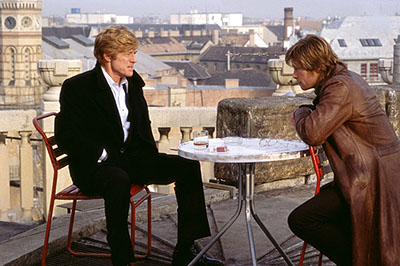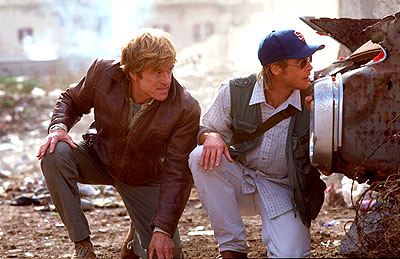

Spy Game has all the necessary elements for a military thriller, it is just its narrative structure that cheapens the overall effect. The movie traces the frantic efforts of Nathan Muir (Robert Redford, The Last Castle, The Horse Whisperer) to rescue Tom Bishop (Brad Pitt, The Mexican, Snatch). Muir is a high level CIA employee retiring from active service. A number of years ago, he recruited Bishop as an agent, and now feels obligated to help Bishop escape from a prison in China. While the main story plays out in the foreground, Spy Game moves into the past to recount their meeting and their experiences together. Unfortunately, these long flashbacks take away much of the momentum building in the rescue storyline. Each time things get interesting, the story shifts back in time.
Another issue dealing with these flashbacks is the lack of suspense. Since Bishop is alive in the future, everybody knows that, although the mission may or may not be successful, Bishop survives each event in the past. Survival of the protagonist is usually the unknown in these movies. Director Tony Scott (Enemy of the State, The Fan) wants to use these stories to highlight specific aspects of the relationship between the two men. Each story in the script by Michael Frost Beckner (Prince Valiant, Cutthroat Island) and David Arata (Brokedown Palace) could be its own movie. By shortening them so much into small vignettes, they feel disjointed, with no overall cohesion. There are portions in Vietnam where Muir first meets Bishop, Bishop's first assignment in Germany, and an extended series of flashbacks in Beirut where the two encounter Elizabeth Hadley (Catherine McCormack, The Tailor of Panama, Shadow of the Vampire). Bishop quickly falls for her while Muir is especially suspicious of her true nature.
In order to try to preserve some sense of urgency, Scott frenetically shoots everything. Quick cuts to black and white and freeze frames zip across the screen in an attempt to create some sense of style. Plus, Scott places the capture of Bishop during a crucial time where China is negotiating trading rights. So Muir has about a day to figure out how to retrieve Bishop. Moreover, a cadre of CIA officials have their own agenda and are keeping Muir in the dark, chief among them Charles Harker (Stephen Dillane, The Darkest Light, Love and Rage). There is too much going on, with not enough attention on Muir's present actions.
Pitt loses out because of the way Scott structures Spy Game. He does not have much time to flex his acting chops, merely to react to situations around him. Redford does a much better job with better material. Muir is still at the top of his game, and needs to do all he can to obtain information about Muir. The script requires Redford to bluff his way into various situations, maintaining a steely calm demeanor that he pulls off well. He has to think on his feet to get snippets of information, and then use that information to his advantage. It's great fun watching Redford do this, but most of his screen time is at a table talking about Bishop. So while it seems like there is a lot going on in Spy Game, much of it is superficial, and nice to watch, but not really meaningful.